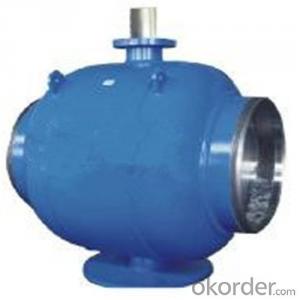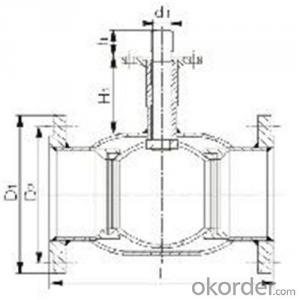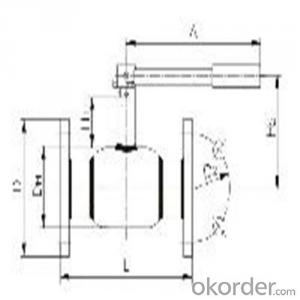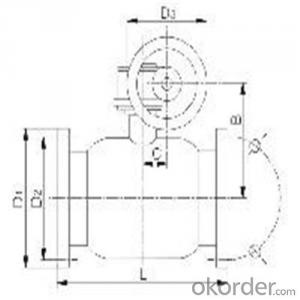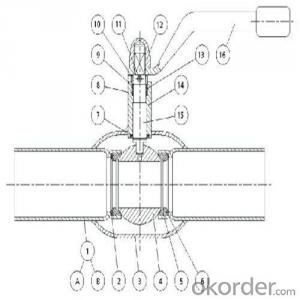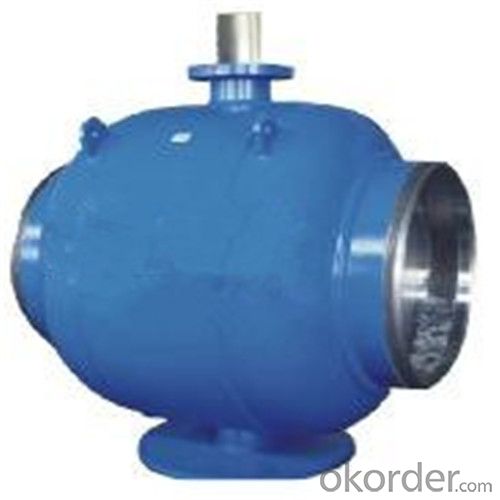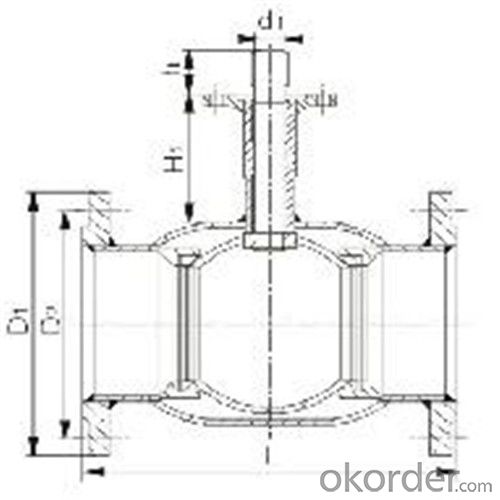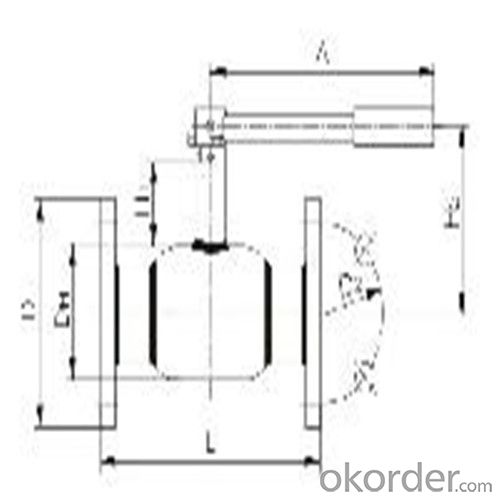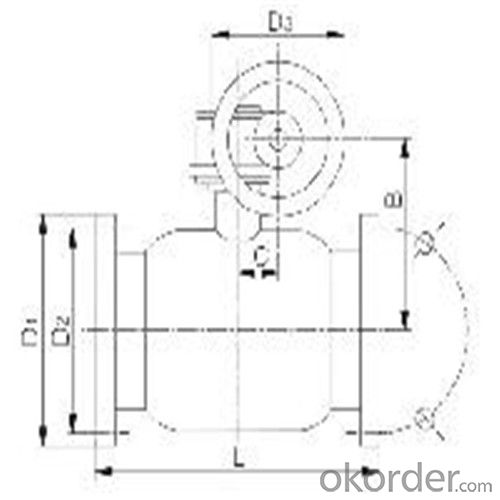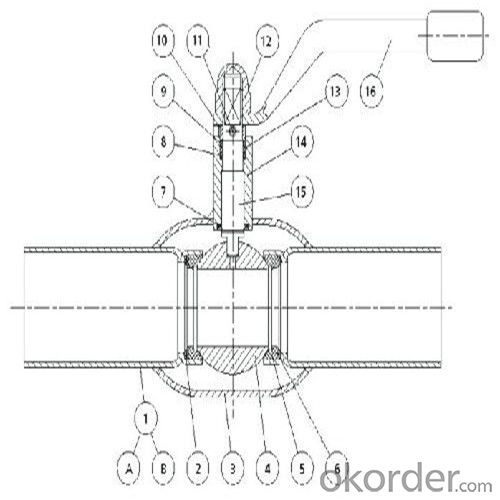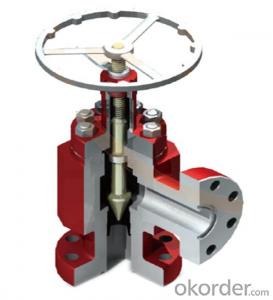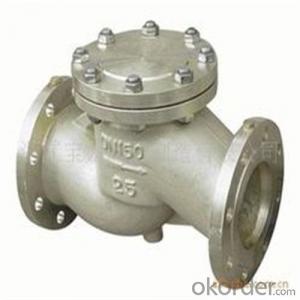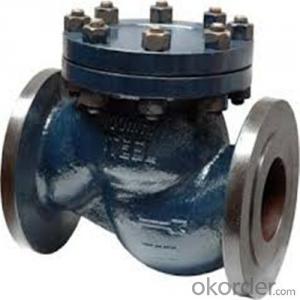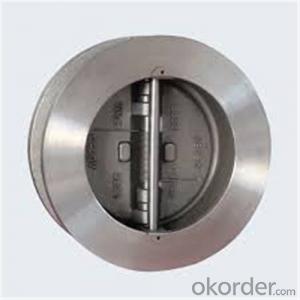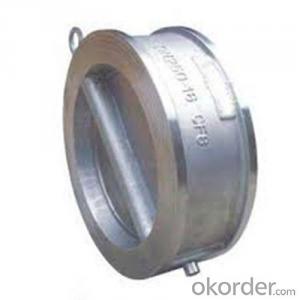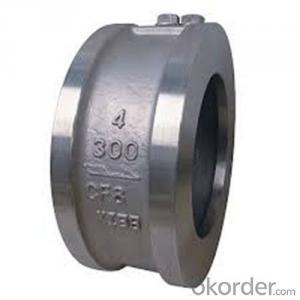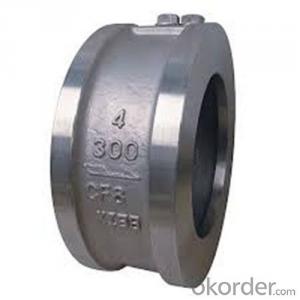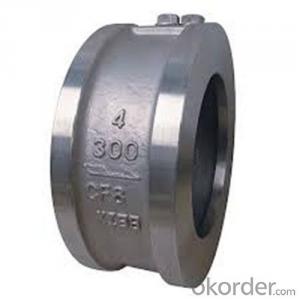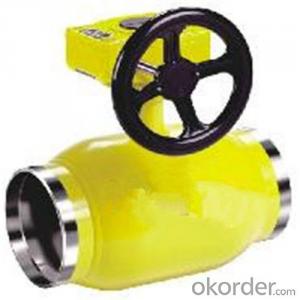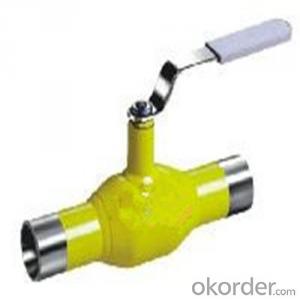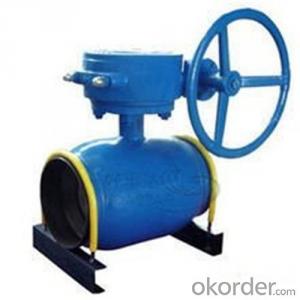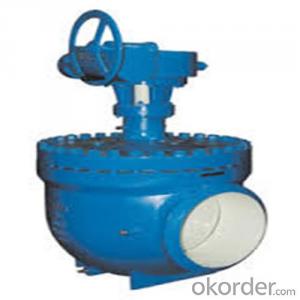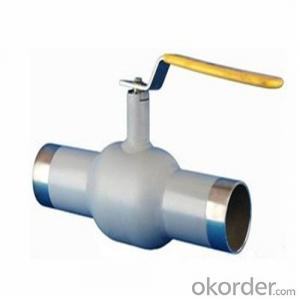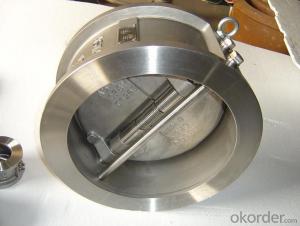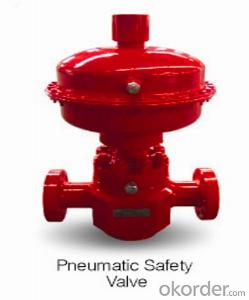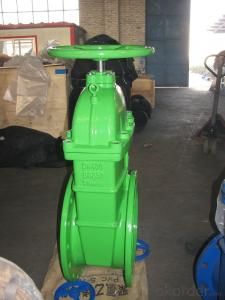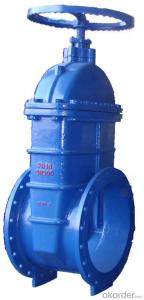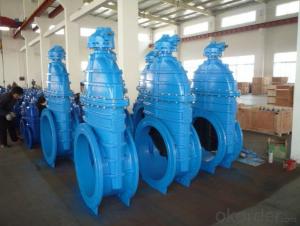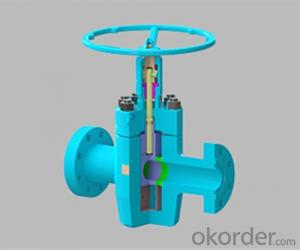Ball Valve For Heating Supply PN 4 Mpa high-performance
- Loading Port:
- Shanghai
- Payment Terms:
- TT OR LC
- Min Order Qty:
- 100 pc
- Supply Capability:
- 1000 pc/month
OKorder Service Pledge
OKorder Financial Service
You Might Also Like
Ball Valve For Heating Supply
Product Description of Ball valve for heating supply:
Technical introduction
★The ball valve is designed as fully welded structure,which can prevent the leakage of medium.
★The valve seat is floating and spring-loade.The seal is made of soft seal materials of PTFE+20%C and Viton B.The seat is tightly abutted against the ball surface by the pressure of a spring,so that even if the media is in low pressure,a reliable sealing can be assured for the ball valve.Double piston effect and double seal(two-seal seat)are adopted in specially designed valve seat to realize double sealing,which makes the tightness of the ball valve more advantageous and the operation easier.
★A floating ball is adopted for DN15-DN200,and a stem and trunnion ball is adopted for DN200 and above,which can ensure the accurate position of different size ball.In other words,the sealing performance,low torque valve and operability can be guaranteed.
★The sealing of the stem is fulfilled by two replaceable O-rings and packing consisting of PTEE+20%C or flexible graphite,as the packing seal material,is fire proof effect,and is specially suitable for fuel gas systems.
★The materials used for the valve body and pipelines are the same(carbon steel or SS steel),valve body and stem adopt SS steel and the packing adopts PTEE+20%C which is corrosion-resistance or flexible graphite.
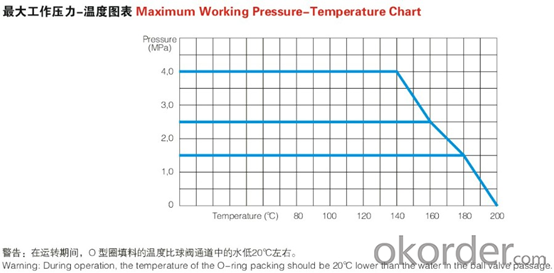
Design Features of Ball valve for heating supply:
Features and Applications
Raymond's fully welded ball valve for heating supplyand Fuel Gas systemare used to control the flow at fully open or closed position,not regulate the flow.Only special types of ball valves can realize the flow regulation.Therefore,our welded ball valves can satisfy the requirements of heating systems,e.g:
★Main pipelines of heating equipment
★Cross channels of heating pipes
★Heat exchanger station and any long distance operating station,e.g:
For the transmission of hot water and two kinds of mixed media(water,air or natural gas),limited to Max.4.0MPa and 200°C.
For the transmission of natural gas and one medium,from -30°C to 60°C,and even up to 150°C using specially designed ball valves.
★Coal gas pipelines,trunk and the branch supply lines.
Standard of Ball valve for heating supply:
Actuator | Gear Handwheel customize |
Connection | Flange SW Weld customize |
Medium | Gas Natural gas Water customize |
Medium Temperature | <200< span="">℃ customize |
Application Fields | Electricity Medical Petrochemical customize |
Connection Standard | EN 1092-1 EN 12627 ISO 7-1 customize |
FAQ of Ball valve for heating supply:
Q1:I can’t find the type of steel check valve which I need. what can I do?
The chart above only lists out some common composition of steel check valve parts.We may provide other different parts material composition according to the customer's request or the actual valve working condition.
Q2:Which certification do your products pass?
Our products are in accordance with ISO 9001、ISO 14001、API 6A、API 6D、TS CE、API607/6FA/BS6755.
Q3:How can I place an order?
The only one thing you should do is to tell us the sepecification about type 、quantity and mode of transportation, then we will send you quotation within 24 hours.
- Q: non-return valves
- ..?..non-return valves..? I will assume that your 'non-return valves', are what is also known as check valves. Check valves allows flow in one direction only. These are used wherever you need to prevent backflow into the system, or to maintain a charged circuit with fluid, until you choose to unload(depressurize ) it. Now, why are they used in discharged lines of salt water, basically to prevent backflow....reason not known, here , requires usage info.
- Q: We just got a new washer and cannot remove the old hoses from the pipes with the shut off valves on them. I don't want to bend or break anything. any suggestions?
- Renpen is correct, but after squirting some WD-40, I would tap it all over with a 7/8 box end wrench ( a big one) and that way loosten the crud that is keeping it from unscrewing and replace them with stainless, flexible hoses.
- Q: We have an ejector in the basement for an in-law apartment. When the check valve kicks in, it can wake us up from a sound sleep. A very loud thunking. Any ideas?
- the check valve would be installed just outside of the crock vertically. The noise I doubt is from the check valve itself. I'd guess it is the pump shutting off and the pipe isn't fastened securely, so it bangs. Check to make sure that the run of pipe leaving the crock is fastened securely. if this is the case the only other option I oculd think of would be to re-position the check valve on a horizontal run of pipe as close to the crock as possible. Most check valves I have seen for ejectors are compression type, it will be messy but not to complicated. Keep a bucket handy, when you crack open that check valve you may need it. Flush the toilet until the pump kicks on a few times, this should clear out most of the nasty stuff. You may also need a short piece of 2 pipe and some couplings to make up for the space of the check valve. If you can hear the water flowing out when the pump kicks on and don't hear it draining back into the crock when it shuts off, the check valve is probably still good.
- Q: need a different pump for? Is this some improvement on the old valve?
- Dita is correct. You do not need a new pump. Most of the new ones (ones you'd find at a bike shop, probably not Wal Mart pumps), will handle both. The newest ones have a smart head where you just plug in the valve, flip the lever, and the pump figures out which valve stem you have. On slightly older pumps, it is a matter of switching the pump head internals around. On the really old pumps (or really cheap ones), you need a brass or alloy adapter that threads onto the presta valve and converts it to schrader.The schrader valve uses a spring to close the valve to prevent air loss. Presta uses the air pressure itself to seal the valve.
- Q: I have a hot water oil burner. I need step by instructions on how to replace the pressure relief valve.Do you know?Please help me.
- I assume you are referring the pressure relief valve on the boiler water vessel, and not the oil line relief valve on the burner. The pressure relief valve is a very important safety device that needs to be properly sized and fitted to boilers and pressure vestals. It is sized and built to relieve as much as, or a percentage more than the BTU output of heat which it's burner can produce. It's inlet size and outlet sizes must never be compromised. It should match what was original on the Mfg.'s specifications on the name Tag of the boiler. (DO NOT TAKE FOR GRANTED THAT THE PRESENT RELIEF IS THE ORIGINAL.) Read the info on the valve tag and compare with the input and output rating on the boiler burner ratings unless your the original owner and know its correct. Because of safety reasons I would recommend.that you allow a professional HV-AC Boiler Technician to change out the relief. He would turn the boiler off, secure the water side and burner side and valves to Isolate your boiler (so as to not drain your system) take the pressure off, drain just a bit and remove the relief ,with the proper wrench. ********Safety note: Most Reliefs are built of soft metal (Brass) or Bronze when fitted out or into the pipe fittings it is very important to use the proper wrench and not place the wrench on the body or any other place on the valve but the proper shoulder made for the proper wrench. When the new valve is installed the the boiler needs to be placed back in original settings of valves and switches. Fill water back on, Vent air from system, fired and tested for leaks. The above safety notes are just a few reasons to have a Licensed experienced boiler man do the job Please be careful, Blessings Rangefinder
- Q: I have a Tippmann A5 and I removed the gasline from the tombstone and when i went to put it back in the valve washer is in the way. Please help
- You examine your volecity with a chronograph your interior reach paintball shop would desire to have them, you additionally can purchase one on Ebay i would not propose a handheld get one you are able to set up on a tripod like a digicam. a diffusion chamber we could the liquid Co2 increase into gas to keep away from the liquid Co2 to circulate into your marker The low stress kit is designed for working Compressed air no longer co2 it enables with decreasing the the working stress of your marker so which you get greater cosistant photos use much less gas
- Q: .The valve behind the toilet is spewing water (we have connected a hose to it and have it emptying into the tub). When we try to shut the water off from that valve, the knob or turny-thingy (the name escapes me right now) just turns and turns correcting the water flow slightly, but not shutting it off.The problem it that we can't find the main water valve outside the house. What am I looking for please?!? Also, we shut a valve off in the garage, but it was for the hot water.Help!
- You can shut it off from there and if you feel confident with your plumbing abilities, take apart your valve take all those parts to the hardware store. I highly suggest either a mom pop hardware store or a local plumbing supply over a big box like Lowes or HD. The big box employees are NOT plumbing experts. I had the same issue with my valve when I bought my place I swapped out what I needed have never had a drip since then.
- Q: A friend of mine is having open-heart surgery next week to replace a heart valve. He needs to decide whether he wants a mechanical valve or a biological one. He is 28 years old. Which would you choose and why?
- The answer depends on many things. Which valve? Why is it being replaced? Overall, mechanical valves last longer, typically 20-30 years. The tissue valves tend to last 15-20. There are risks and benefits to each, such as closure efficiency, infection rates, and other types of failure etc. If it were me, I'd go with a mechanical valve. However, he really, really needs to talk seriously with his doc before deciding. The doc will give answers in context to his unique situation. That is something we cannot do on this site, simply because we do not know him or his medical history. Best of luck.
- Q: I've been diagnosed with mitral valve prolapse, my doctor just told me that i need to setup an appointment with the hospital to look at treatments for heart mitral valve prolapse-to possibly have a heart valve replaced. I am wondering if i should setup an appointment with mayo clinice in minnesota to get another opinion on that? I'm wondering if surgery is an only option available to me, i have been taking beta blockers that have been no help for the past 3-4 months. Thanks.
- Beta blockers. These drugs help prevent irregular heartbeats. They work by blocking the effects of the hormone epinephrine, also known as adrenaline. As a result, the heart beats more slowly and with less force, thereby reducing blood pressure. Beta blockers also help blood vessels relax and open up to improve blood flow. Valve replacement. Valve replacement is done when valve repair isn't possible. In valve replacement surgery, the damaged mitral valve is replaced by an artificial (prosthetic) valve. The two types of artificial valves are mechanical and tissue. Mechanical valves, which are made of metal, may last a long time. However, if you have a mechanical valve, you must use an anticoagulant medication, such as warfarin (Coumadin), for the rest of your life to prevent blood clots from forming on the valve. If a blood clot forms on the valve and breaks free, it could travel to your brain and cause a stroke. Tissue valves are made from biologic tissue such as a pig's heart valve. These kinds of valves are called bioprostheses. They may wear out over time and need replacement. However, an advantage of the tissue valve is that you don't have to use long-term anticoagulant medication. Please see the web pages for more details on Mitral valve Prolase and Heart valve surgery.
- Q: i have an 87' monte carlo ss, 64K on 305 w/ cam, headers, roller rockers and springs. ive been seeing blue smoke out of my exhaust ALOT during start up, but it also continues to smoke at idle, i've been told it's a good chance i need my valve seals replaced and was wondering what the general ballpark was assuming there was no other complications in the process of replacing these?
- Hate to say this but Chevrolet never put *valve seals on top of the valve guides in a stock OEM engine. Standard Chevy engines depended upon the umbrella shield that fits around the top of the valve springs held in place by the spring retainers and valve split locks as shields to keep splashing pushrod oil off the valve stems. Any time you have smoke at start-up and at idol you have worn or struck rings in the piston ring grooves or mis-shapen cylinder walls. Typical valve guide wear delevers blue smoke put the tail pipes on *deceleration when vacuum pulls oil down the increased clearance between the valve stems and the honed valve guide holes.
Send your message to us
Ball Valve For Heating Supply PN 4 Mpa high-performance
- Loading Port:
- Shanghai
- Payment Terms:
- TT OR LC
- Min Order Qty:
- 100 pc
- Supply Capability:
- 1000 pc/month
OKorder Service Pledge
OKorder Financial Service
Similar products
Hot products
Hot Searches
Related keywords
